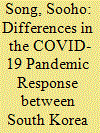| Srl | Item |
| 1 |
ID:
188768


|
|
|
|
|
| Summary/Abstract |
With the 21st century surge of populism, a debate has emerged over the relationship between nationalism and populism. Some scholars maintain these two phenomena are distinct and should be analytically differentiated; others hold the difference between the two is primarily an artifact of how the scholarship has evolved around each. To bridge these positions, this paper argues that by reorganizing our typologies of nationalism, we can better account for why populism seems to have become fused with nationalism. To do so, it introduces a new typology that distinguishes among state-creating, state-consolidating and state-defensive nationalisms. Applying this new typology, the case made is that we are experiencing a convergence of populism and nationalism today because we are currently in an era of defensive nationalism.
|
|
|
|
|
|
|
|
|
|
|
|
|
|
|
|
| 2 |
ID:
189471


|
|
|
|
|
| Summary/Abstract |
The impact of the COVID-19 pandemic has varied across countries. Some countries controlled the virus relatively well, while others did not. In the United States, almost a million people died. However, South Korea’s death toll is only about 12,000 even though its population is about one-sixth of the United States. What caused the difference? We argue that public compliance to government direction is the primary reason. South Korea’s collective culture valuing communal benefits helped the people conform to government directions, such as mask wearing in public places. By contrast, American people resisted the government policies that restrict individual freedom due to the individualistic culture. In South Korea, historical experiences of relatively frequent national crises led to the rise of defensive nationalism, resulting in national union. However, the United States had relatively fewer national crises, and thus nationalism did not rise. Instead, national division, xenophobia, and hatred toward Asians prevailed in the United States. Besides the cultural differences, differences in national leader’s characteristics, past experiences of public health crisis, and political system also contributed to the different outcomes of the crisis.
|
|
|
|
|
|
|
|
|
|
|
|
|
|
|
|